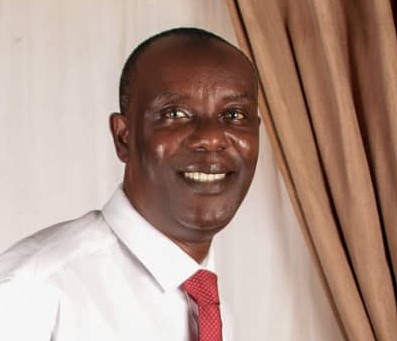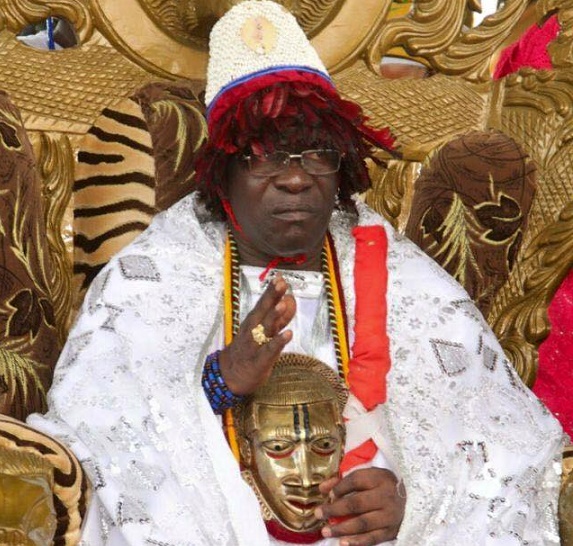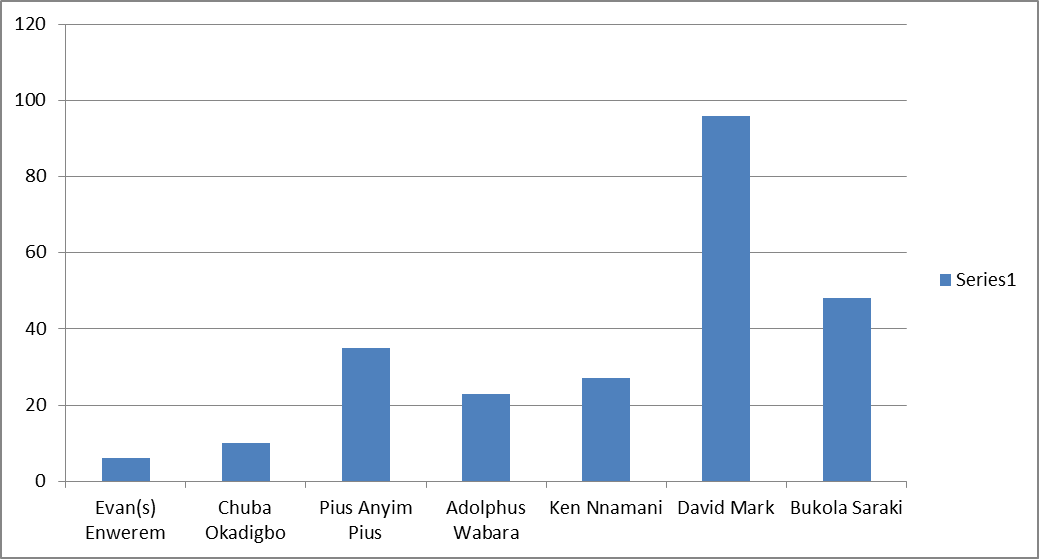AfDB impacts in Africa endorse Adesina’s second-term bid as president

By Theophilus Abbah
The impact of Dr Akinwumi Adesina’s presidency at the African Development Bank (AfDB) in the last five years could be felt and touched in many parts of Africa. They speak eloquently in favour of his re-election as president of the development bank, in spite of opposition from the United States. At an ‘African Journalists Hangout’ webinar, coordinated by US-based African journalist Benjamin Tetteh, on June 14, 2020, Adesina’s tenure was reviewed. Surprisingly, journalists from African countries who participated pointed at visible projects sponsored or coordinated by AfDB in their countries. Apart from panellists Selay Kouassi (Ivory Coast), Alpha Kamara (Sierra Leone), George Wiafe (Accra), and Theophilus Abbah (Nigeria), participants from all over Africa who sent in messages on the social media were united about how Adesina’s first term affected their countries. A review of some of the projects executed by AfDB shows why panellists on the webinar and commentators have expressed support for Adesina.

Ugandan President Museveni: one of the African leaders who support Adesina’s re-election.
As it were, AfDB projects in several African countries literally touched specific challenges facing them. For instance, in Burkina Faso, one of the countries affected by desertification in the Sahel region, electricity has been a major challenge, with over 90 per cent of the population without power. To deal with the situation, the AfDB initiated what it called ‘Desert to Power’ programme in 2017, in order to ‘light up and power’ the Sahel with electricity supply through photovoltaic (PV) solar systems. The project, targeted at countries in the Sahel belt, commenced in Burkina Faso. Called Yeleen Rural Electrification Project, it involved the production of off-grid energy so it could be deployed to end-users without the complexity of routing the energy through the country’s national grid.
The project has been warmly received in the low-income West African country, bedevilled with declining rainfall, rising temperatures, floods and droughts. Agriculture, the mainstay of Burkina Faso’s rural economy, is also the most vulnerable to the impacts of climate change. The ‘desert to power’ initiative of AfDB has given hope to 90 per cent of the population of Burkina Faso, who lives in rural areas, to access electricity at a low cost.
In Cote d’Ivoire, many households have benefitted from AfDB’s ‘Saemaul Undong Model Village’ project, a partnership between the development bank and South Korea. This is a micro-credit scheme under which some $500 is given as loan to women in small households to engage in the cultivation of tomatoes for sale. An AfDB report on this scheme says that through it, AfDB, the Korea-Africa Economic Cooperation (KOAFEC) Trust Fund and the Government of Cote d’Ivoire have “transformed the economies of two villages and improved the lives of 2,961 inhabitants in Zatta and in N’gbekro, two villages near Yamoussoukro, the country’s capital.” Beneficiaries of the small grants plough back the profits into their farms and, with a high turnover, they are lifted from abject poverty, as some have changed houses, from mud to brick, and many of them could access medical facility in clinics, instead of depending on local herbs. Similar projects have been launched in Ethiopia and the Democratic Republic of Congo.
The report says, “Saemaul Undong” means the “New Community Movement” or the “New Village Movement” in Korean. It focuses on local community development with diligence, self-help and cooperation as its guiding ethos. The goal: for the Saemaul Undong-inspired development approach to be applied at the country and regional levels and for it to have a domino effect on socio-economic growth.”
Furthermore, the AfDB has executed a clean water project in Somalia, another drought-stricken and war-torn African country. With the lack of potable water and sanitation in both rural and urban communities in Somalia, AfDB’s clean water and sanitation projects have become a conveyor of peace and harmony across social divides in the arid nation in the Horn of Africa.
The objectives of this project included improving access to water and sanitation services in rural areas of Somalia; reducing infant and child mortality caused by water-borne diseases; eradicating water-borne diseases; improving the technical capacity of local administrators to manage water infrastructure; promoting sustainable water management practices, solutions, systems and structures; and building resiliency into water systems/structures so they can withstand future drought and environmental shocks.

How peasants suffer for water in Sudan
Working with the Somali national government, local authorities and the International Organization for Migration (IOM), the UN agency responsible for global migration, the AfDB has brought succour to communities in Somalia. The government acknowledged the impact of the project through Salimo Aloi Ibro, Somalia’s Minister for Energy and Water Resources, who remarked that Somalia would love the project extended to other communities like “Kismayo, Baidoa, Afgoye and Jowhar – places where the needs on the ground far outstretch available resources.”
John Sifuma, a Water and Sanitation Specialist at AfDB, commenting on this project, says: “The project falls under the fifth High 5 priority of the Bank (Improve the quality of life for the people of Africa) and is aligned to Somalia’s National Development Plan. The Bank will continue working closely with the Federal Government of Somalia to support the implementation of the government’s development agenda.”
“The Bank is responding to the challenge of supporting inclusive growth, and the transition to green growth, by scaling up investments and implementation of its ten-year strategy ….” Sifuma further observes.”
According to Dyane Epstein, the IOM Somalia Chief of Mission: “This project endeavours to improve the quality of life for an estimated 175,000 Somalis. As solutions to sustainable water provision and infrastructure are developed, other socio-economic activities will also flourish. This includes the rearing of livestock, which remains the main source of livelihoods for the majority of this project’s beneficiaries.’’

Tanzania business district
Another country that has benefitted from AfDB intervention in Sudan, where Drought Resilience and Sustainable Livelihoods Programme (DRSLP) has been executed. According to AfDB, the objective of this project is “to enhance drought resilience and improve livelihoods of the pastoral and agro-pastoral population. The project’s sector goal is to contribute to poverty reduction, food security, and accelerated sustainable economic growth through enhanced rural income.” The project has impacted communities in Sudan in diverse ways as it has improved access to water, enhanced the health of the people since clean drinking water is having positive health impacts on human beings and increasing the productivity of animals. The project has also made it possible for afforestation and tree seedling production policies to be implemented. These would reduce soil degradation and deterioration and help to maintain the ecosystem.
In Malawi, rural households have received support from AfDB, which has assisted them in adapting to the negative impact of climate change. Though agriculture is the mainstay of the Southern African country, climate change has affected it, as, crops dry up before maturity, lands are damaged due to floods, soil degradation (soil erosion, loss of soil fertility, and siltation of fields) is a constant feature, shortage of water leads to a reduction in farm yield, and leading to food insecurity. The Climate Adaptation for Rural Livelihoods and Agriculture (CARLA) project, which began in 2011, has made it possible for households in Malawi to savour some relief.
The project has also made it possible for afforestation and tree seedling production policies to be implemented
A review report on its impact as at 2016 by AfDB showed that there is “increased household agricultural productivity (maize from one ton per hectare to 4.5 tons per hectare) and reduced food insecurity from nine months of hunger in a year to zero for direct project beneficiaries. A total of 6,665 goats were distributed at the end of the project. Farmers who benefited from the project have testified to the success of this programme.” Apart from helping them to acquire the knowledge that makes them become resilient to climate change impacts, CARLA has facilitated increased food security among participating households and led to the reduction of the lean period from three months to one month.

Water project by AfDB in Malawi
The project has also improved access to safe water and reduction of incidence of water-borne diseases through boreholes in Malawi. It has further facilitated the diversification of sources of income for many households through sales of livestock and livestock products. It has enabled the household to take care of their needs, pay fees for children, and acquire building materials.
These are few instances of the impact that AfDB, under Adesina, has made on the lives of ordinary households in some countries in Africa. This is why many African presidents and leaders have supported the re-elected of Dr Adesina for another five-year term. As a result of America’s opposition to his re-election over allegations of conflict of interest against him, AfDB has set up a three-member committee to review the issues and how the bank had handled it. The panel is headed by former President of Ireland and ex-United Nations Human Right Commissioner, Ms Mary Robinson. As Africans wait impatiently for the outcome of the panel’s investigation, it is apparent that they will be disappointed if Adesina, whose tenure has impacted them positively, is disqualified from contesting AfDB presidency in order to continue his good works. As of May 2020, Dr Adesina was the only candidate for the position.
The Insight Report
Nigeria Coverage



